Brussels agrees on more military aid for Ukraine, but no new sanctions. Activists have made a joint call for a European embargo on Russian oil, gas and coal, as thousands prepare for protests against continued hostilities around the world.
On the other hand, Germany’s Olaf Scholz warns immediate Russian energy ban would trigger recession in Europe. German chancellor’s resistance to instant embargo comes growth forecasts.
Chancellor Scholz stood firm on Germany’s resistance to an immediate embargo of Russian energy and warned it would trigger a recession. Cutting Russian energy imports would trigger an economic crisis. Other European states and the US are pushing for the EU to impose tougher sanctions on Russian energy, but Germany has resisted because more than half of the gas and coal that it imports comes from Russia as does a third of its oil.
“Hundreds of thousands of jobs would be at risk,” he said. “Entire branches of industry are on the brink”, Scholz pointed out. His stance was backed by the BDI, Germany’s main business lobby group, which warned that cutting off Russian gas supplies to the EU would have “incalculable consequences” and cause “production disruptions, employment losses and, in some cases, massive damage to production facilities”.
The EU is not prepared for a short-term, comprehensive energy embargo,” said BDI president Siegfried Russwurm, adding that “it would jeopardize EU unity and the bloc’s ability to act economically and politically”.
Sanctions must not hit European states harder than Russian leadership,” Scholz said, adding that restrictions on trade were already hurting German citizens, not only with higher fuel prices but also with factories warning they may have to suspend work.
The Ifo Institute, a Munich-based think-tank, cut its forecast for German gross domestic product growth this year to between 2.2 per cent and 3.1 per cent, down from an earlier prediction of 3.7 per cent. It said higher prices would erode consumer purchasing power by €6bn in the first quarter.
The Russian onslaught is slowing the economy through a combination of significantly higher commodity prices, sanctions, increasing supply bottlenecks for raw materials and intermediate products, and increased economic uncertainty.
German GDP expanded 2.9 per cent last year and despite a contraction in the final three months of 2021, growth had been expected to accelerate this year, boosted by the lifting of restrictions to control coronavirus and an easing of supply bottlenecks in industry.
However, Germany’s reliance on Russian energy imports has left it exposed to soaring oil and gas prices, while its large industrial sector is being hit by disruption to supplies of key materials from Russia and Ukraine.
Ifo said its most pessimistic scenario was based on oil prices hitting €140 a barrel by May and staying above €120 a barrel by the end of the year, while natural gas prices would hit €200 per MWh by May and stay above €160 per MWh over the rest of the year.
Daily data collected by research company Morning Consult showed German consumer confidence had plummeted since Russia’s invasion of Ukraine, falling to 65 on March 23, down from 80 in early February. Any figure below 100 indicates a higher proportion of consumers with negative views of their personal and general economic situation than those with positive views.
Almost 40 per cent of German consumers reported a deteriorated personal financial situation and they expected it to worsen further this year, according to Morning Consult. More than a quarter said this was a bad time to make large purchases.
The steady recovery in visits to German retail and entertainment venues this year stalled in March, according to Google Mobility data, indicating that rising prices are already stifling consumer spending.
The European Commission said its flash estimate of March consumer confidence fell 9.9 points in the eurozone to minus 18.7, its lowest point since May 2020, when much of the bloc’s economy was shut down due to the Covid-19 crisis.
German consumer prices rose 5.5 per cent from a year earlier in February and economists expect them to keep rising. Christian Ossig, head of the German banking association, said on Wednesday it expected inflation to rise above 7 per cent in the coming months.

 Noor Trends News, Technical Analysis, Educational Tools and Recommendations
Noor Trends News, Technical Analysis, Educational Tools and Recommendations




